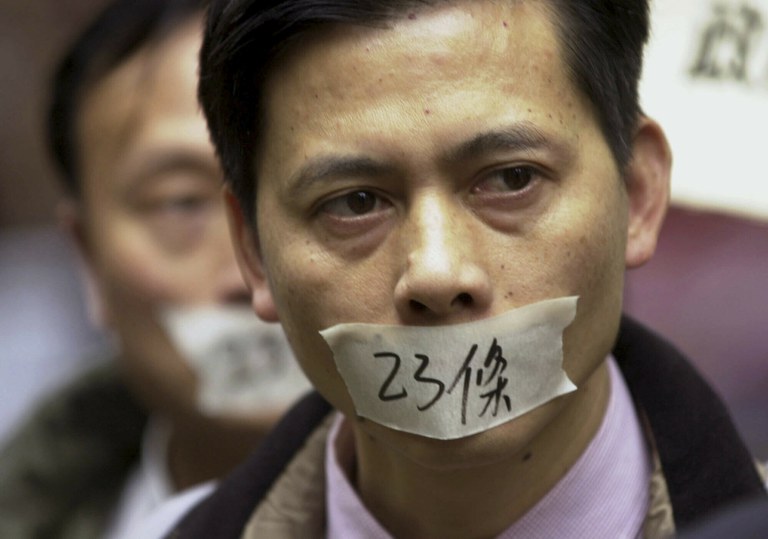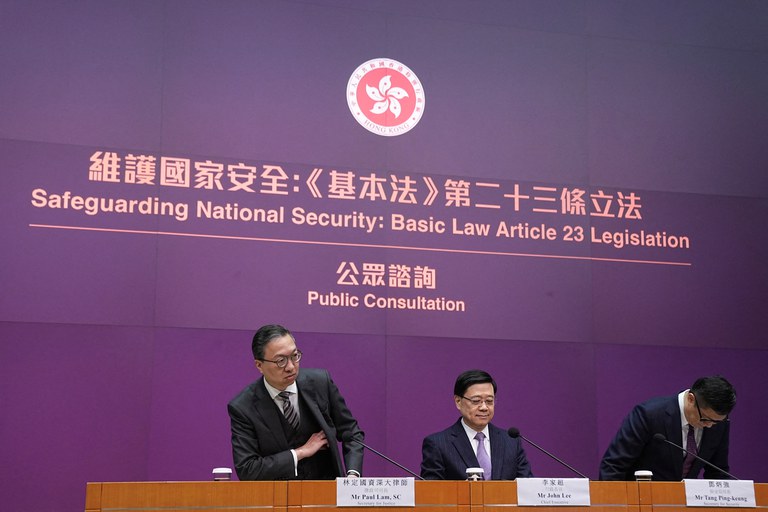Hong Kong security chief Chris Tang has lashed out at the London-based rights group Hong Kong Watch after it issued a statement signed by 86 groups saying that forthcoming security legislation would have “devastating consequences” for human rights in the city.
The new legislation, called Article 23, criminalizes treason, insurrection, the theft of state secrets and other national security offenses. It is billed by the government as a way to close “loopholes” in the already stringent 2020 National Security Law.
But Hong Kong Watch and the other groups said the definitions of such crimes were vague in the bill, and would criminalize people’s peaceful exercise of their human rights.
“The proposed law includes a number of procedural changes that will dramatically undermine the Hong Kong people’s due process and fair trial rights,” said joint statement signed by 86 organizations.
“The introduction of Article 23 will bring further devastating consequences for human rights beyond those brought by the National Security Law when it was imposed by Beijing in 2020,” said the statement, which called on governments to publicly oppose the law, and for those responsible to be sanctioned.
“The last time the authorities attempted to introduce Article 23 in 2003, over 500,000 Hong Kongers took to the streets in protests with the plans abandoned,” the statement said, adding:” But now they can no longer speak out against it.”
The bill is highly likely to be passed by the Legislative Council now that electoral rules have been changed to allow only “patriots” to run for election.
‘Slander and intimidation’
Tang, who has previously claimed that recent waves of mass popular pro-democracy movements in recent years were the work of “foreign forces” operating in Hong Kong, criticized Hong Kong Watch for using “gangster tactics.”
Tang told a news conference in Hong Kong on Monday that most of the groups that signed the letter, which include Freedom House, Chinese Human Rights Defenders, Hongkongers in Britain, Human Rights Watch and the Index on Censorship, were “anti-China organizations seeking to disrupt Hong Kong.”

He accused “anti-China and anti-Hong Kong” organizations of “slander, intimidation … wrong, misleading and making something out of nothing,” after they criticized the planned law, which analysts have warned will broaden the definition of what is a “national security” matter still further.
“These comments are slander and intimidation by external forces who want to endanger our national security,” he said, brushing aside the possibility of further sanctions on Hong Kong officials.
“The more you sanction us, the more it appears that we’re doing the right thing,” Tang said, likening the law to putting in “doors and windows to prevent burglaries,” and accusing the groups who signed the statement of “gangster” tactics.
Tang accused Radio Free Asia of reporting what he described as “false” criticism that the new law would target media organizations. He called the media outlet a “foreign force” that was misleading the people of Hong Kong.
He said only those who “deliberately” set out to slander the government could be liable under the planned law.
RFA, funded by the U.S. Congress to provide independent news in countries that lack a free press, has not publicly responded to Tang’s comments.

Tang said the public response to the Article 23 legislation had been welcoming, and that claims that the new law would boost police powers to detain people at will were “attempts to intimidate the people of Hong Kong.”
“I believe that our friends in the media will not endanger national security,” he said, in response to concerns that media organizations could be targeted under the law for platforming views deemed a threat to national security.
Chief Executive John Lee said on Tuesday that his administration will seek to pass the new law as soon as possible.
“Our work on legislation under Article 23 of the Basic Law will be advanced at full speed,” Lee said. “The government will move forward, and I believe that the Legislative Council will fulfill their constitutional responsibilities in this regard as soon as possible.”
Translated by Luisetta Mudie. Edited by Malcolm Foster.

